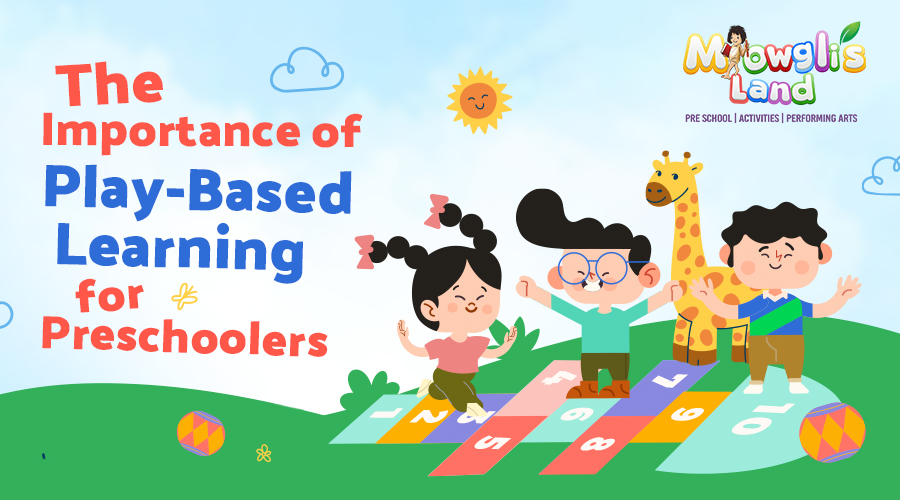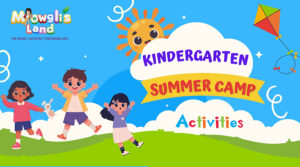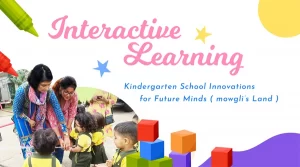Playtime isn’t just fun; it’s a superpower! In the magical world of preschool, play-based learning is the key to unlocking creativity, imagination, and essential life skills in our preschoolers. Gone are the days of boring lectures and strict classroom rules. With Mowgli’s Land, we’re diving into why learning that is based on play is not just important, it’s essential for our preschoolers!
What is Play-Based Learning?
Think of it as a fun-filled adventure where children learn by doing what they love most- playing! Preschoolers engage in activities that spark curiosity and excitement instead of sitting at a desk. Whether they’re building block towers, role-playing as superheroes, or creating colourful art, every moment of play is packed with valuable lessons.
The Different Types of Play-Based Learning
This kind of learning comes in various flavors, including:
1. Free Play
This is when kids get to choose their activities, letting their imaginations run wild. Want to be a pirate or a princess? Go for it! Free play is crucial for fostering creativity, problem-solving skills, and independence. Children engage with their surroundings in ways that pique their curiosity, often leading to spontaneous learning moments.
2. Guided Play
Here, adults step in to offer a little help while kids lead the fun. It’s like having a co-pilot on a creative journey! This type of play strikes a balance between structure and freedom. Adults can introduce specific materials or themes, encouraging children to explore within a framework. For instance, a teacher might provide building blocks and suggest a theme, like “cities,” allowing kids to build their interpretations.
3. Sociodramatic Play
Kids role-play different scenarios, such as a trip to the grocery store or a day at the zoo. This helps them learn about the world around them while having a blast! Sociodramatic play encourages kids to experiment with social roles, understand perspectives, and develop empathy. Through this type of play, they practice language skills, enhance their ability to cooperate with peers and refine their emotional expression.
Also read: Promoting Overall Growth in Preschoolers
Why is Play-Based Learning So Awesome?
1. Supercharged Cognitive Development
Play is not just fun; it’s a brain booster! During play, children explore new ideas, which helps them develop:
-
Critical Thinking Skills
When building with blocks, kids learn about balance and stability. Who knew tower construction could teach engineering? As they experiment with different structures, they engage in problem-solving and learn to make predictions. This hands-on approach fosters a curious mindset, encouraging children to ask questions and seek solutions.
-
Language Skills
Through play, children engage in conversations, expanding their vocabulary and learning how to express themselves. Whether they’re negotiating the rules of a game or storytelling during imaginative play, kids practice verbal communication and develop confidence in their speaking abilities. They also learn to listen and respond, enhancing their overall language proficiency.
2. Building Social Skills
Playing with others is a fantastic way for kids to learn how to interact and communicate. In the world of play, they pick up:
-
Teamwork
Playing games or working on projects together teaches children the magic of sharing and cooperating. “Let’s build this fort together!” becomes a lesson in collaboration. They learn to value others’ contributions, negotiate roles, and celebrate group achievements. These experiences lay the groundwork for positive social interactions throughout their lives.
-
Empathy
By role-playing different characters, kids learn to understand and relate to others’ feelings. “I understand how you feel, Mr. Lion!” This imaginative engagement fosters empathy as children put themselves in others’ shoes, promoting emotional intelligence and awareness. It helps them recognize diverse perspectives and respond compassionately.
3. Emotional Development Made Fun
Learning that is based on play is a wonderful way for children to express their emotions. It provides a safe space for them to:
-
Share Their Feelings
Pretend play allows kids to process their experiences and emotions. They can act out scenarios that might be confusing, helping them make sense of their world. Through this exploration, children learn to articulate their feelings and build self-awareness.
-
Develop Resilience
Through play, kids learn that it’s okay to make mistakes. This playful trial-and-error approach encourages a growth mindset, teaching children that challenges are learning opportunities. They discover the value of perseverance and adaptability, essential traits for overcoming obstacles in life.
4. Get Moving with Physical Development
Play also keeps our little ones active! Whether they’re running around or crafting masterpieces, play promotes:
-
Gross Motor Skills
Activities like climbing, jumping, and running enhance coordination and strength. Who says playtime can’t be a workout? Engaging in physical play helps children develop the muscles and coordination needed for everyday tasks, supporting their overall health and fitness.
-
Fine Motor Skills
Using crayons, scissors, or building blocks helps kids refine their hand-eye coordination. Watch out, world- future artists and builders in the making! These activities not only strengthen their dexterity but also prepare them for more complex tasks, such as writing and self-care activities like buttoning shirts.
Creating the Perfect Learning Environment
- Safe and Fun Spaces
Design play spaces as open areas that encourage exploration and movement, transforming them into mini-adventure zones. To enhance the experience, offer a diverse range of materials such as blocks, art supplies, and sensory bins, allowing kids to engage in various types of play, because variety truly is the spice of learning.
- Encouraging Exploration and Discovery
Engage kids by asking open-ended questions that spark their curiosity, such as, “What do you think will happen if we add more blocks to the tower?” Additionally, providing them with your presence can provide valuable support and inspire new ideas.
Overcoming Challenges in child-centred Learning
1. Finding the Right Balance
Balancing structured activities and free play can be tricky. Educators should strive to make play purposeful while allowing children the freedom to explore.
2. Changing Misconceptions
Some may think that play isn’t “real” learning. It’s essential to communicate that this type of learning is a powerful tool for developing critical skills that last a lifetime.
Conclusion
In the end, play-based learning is like a treasure chest filled with valuable gems for our preschoolers. It nurtures their cognitive, social, emotional, and physical development, setting them up for success in school and beyond. By creating supportive environments and encouraging exploration, we can unleash the magic of play and help our little learners thrive.
So, let’s celebrate playtime at the best preschool in Bhopal– because it’s not just fun; it’s a superpower for our future leaders!




